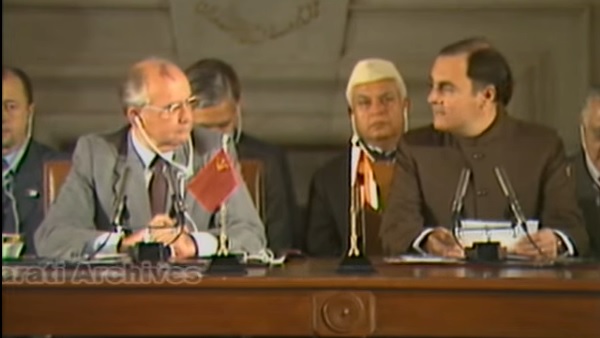Mikhail Gorbachev, a friend of India who visited twice in the mid-1980s, died on Tuesday aged 91 after a prolonged illness. He was the last Soviet president who ended the Cold War without bloodshed though could not prevent the collapse of the Soviet Union.
“Mikhail Gorbachev passed away tonight after a serious and protracted disease,” said Russia’s Central Clinical Hospital. President Vladimir Putin expressed “his deepest condolences”, and World leaders paid tribute. European Commission chief Ursula von der Leyen said Gorbachev, who was awarded the Nobel Peace Prize in 1990, had opened the way for a free Europe.
U.S. President Joe Biden said he had believed in “glasnost and perestroika – openness and restructuring – not as mere slogans, but as the path forward for the people of the Soviet Union after so many years of isolation and deprivation.”
He will be buried in Moscow’s Novodevichy Cemetery next to his wife Raisa, who died in 1999.
On becoming general secretary of the Soviet Communist Party in 1985, aged just 54, he had set out to revitalize the system by introducing limited political and economic freedoms, but his reforms spun out of control.
“He was a good man – he was a decent man. I think his tragedy is in a sense that he was too decent for the country he was leading,” said Gorbachev biographer William Taubman, a professor emeritus at Amherst College in Massachusetts.
Gorbachev’s policy of “glasnost” allowed previously unthinkable criticism of the party and the state, but also emboldened nationalists who began to press for independence in the Baltic republics of Latvia, Lithuania, Estonia and elsewhere.
India Visits in 1986, 1988
Gorbachev, throughout his tenure championed for strong Soviet-India relations and visited India twice in 1986 and 1988. In 1986 he was received by then Indian Prime Minister Rajiv Gandhi.
“When friends come calling, our hearts light up. We are delighted to have you in our midst,” Rajiv Gandhi said during the press conference.
Gorbachev said India and Soviet Russia strive for lasting global peace and said Soviet Russia will always support India’s real interests. “We shall not take a single step in our foreign policy that could damage India’s real interests,” Gorbachev said. It was during this visit that Gorbachev and Gandhi also signed the Delhi Declaration which “called for the complete destruction of nuclear arsenals before the end of the century, and asserted the importance of solving problems in a non-violent way.”

Soviet Russia and India opened more avenues of cooperation in sectors of space, infrastructure development and defence during the visit. Russia committed to provide India with the latest military hardware and months after, India received advanced MiG29s from Soviet Russia.
When Rajiv Gandhi visited Moscow in 1987, Gorbachev held a private meeting with him lasting for six hours. He also dedicated a monument to his mother and former prime minister Indira Gandhi and named a Moscow square in her memory.
